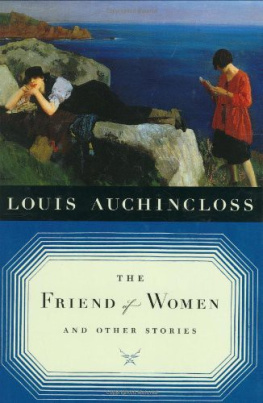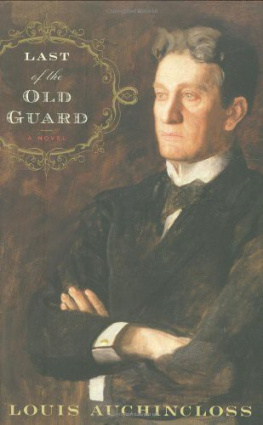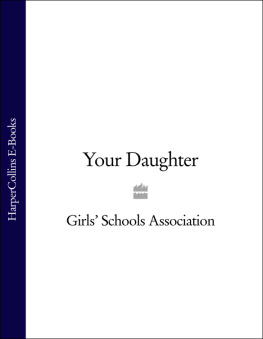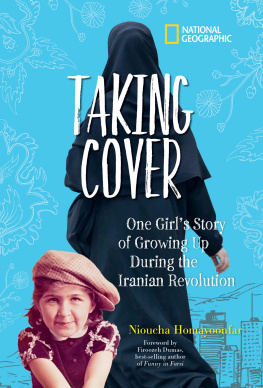Copyright 2007 by Louis Auchincloss
All rights reserved
For information about permission to reproduce selections from this book, write to Permissions, Houghton Mifflin Harcourt Publishing Company, 215 Park Avenue South, New York, New York 10003.
www.hmhbooks.com
The Library of Congress has cataloged the print edition as follows:
Auchincloss, Louis.
The friend of women and other stories / Louis Auchincloss.
p. cm.
ISBN -13: 978-0-618-71866-5
ISBN -10: 0-618-71866-4
1. Upper classFiction. 2. Rich peopleFiction. I. Title.
PS 3501. U 25 F 75 2007
813'.54dc22 2006011044
e ISBN 978-0-544-10900-1
v2.1012
For
V IRGINIA D AJANI,
imaginative and resourceful executive directorof the American Academy of Arts and Letters
1. L'Ami des Femmes
I.
I LIKE TO THINK of myself as l'ami des femmes, although in a longish lifeI am now sixtyI have never married, nor even (though I hardly glory in it) had a love affair. But as a confirmed bachelor and head of the English department at Miss Dickerman's Classes, the finest, at least in my opinion, of Manhattan's private day schools for young ladies, I have made it my lifework to convince my pupils that there is nothing that men can do, outside of the mindless fields of violent sport and physical combat, that women cannot do as well or even better. In this year 1960 (I share the age of the century), the realization of such an ideal is much more widely shared than when I started preaching it, but in the nineteen thirties, the period treated in this memoir, it had still a long road to travel.
Obviously, at least to any devotee of French drama, the name I give myself is taken from the play of Dumas fils in which the protagonist dedicates himself to the task of saving a married woman, trapped in what she has deemed an incompatible union, from taking a lover. He believes, like La Rochefoucauld, that the wife who has taken but one lover in her life is a rare being, and that the first misstep inevitably entails successors. No doubt contemporary mores have left Dumas fils and myself behind, as dead as the dodo. Dumas is remembered today only because Verdi made a beautiful opera out of one of his plays, and he himself came to realize the inevitable doom of a double standard established by an aristocratic dsoeuvr society, where the men were engrossed with seduction and hunting and their neglected wives left with nothing but children and the small satisfaction of their own chastity. And when he at last advocated that men also should be virgins until marriage, he was no longer taken seriously. Both sexes had opted for liberty in what they chose to call love.
My difference from Dumas's hero is not that I am any less the friend of women, but that I do not see their problem so much as subjection to the laws of men as subjection to men themselves. Sex is their danger, and freedom to indulge in it only makes it more so. It is not that I think it should hold no role in their lives, but that it should play a much smaller one than it does. Very much smaller.
There! I've said it. I have articulated the greatest heresy of our time. The first thing a modern biographer wants to know about his subject is what was his sex life like. And if there doesn't seem to have been one, as in my own, what is he re-pressing? Is he homosexual? Well, call me neuter. The beauty I have passionately sought all my life has been in literature, which I have tried to share with those young persons most open to it. It was not in football or baseball fields that I found my sharers.
Am I really so odd? It wouldn't have seemed so in the past. Religions all over the world have seen untold numbers of men and women devote themselves to chastity; sects have existed that shunned all forms of sexual union. My message to women has been, See first and foremost what you can do to make something of yourself, free of any other human being. That accomplished, let husbands and children come as they may.
If I say so myself, I have been a popular teacher at Miss Dickerman's Classes. I have now served under three headmistresses, the last and longest tenured of whom treats me as a kind of first minister and consults with me on every change in school policy. The trustees regard me as a desirable extra man for their dinner parties, and mothers of my students seek my advice, sometimes embarrassingly, as to their daughters' personal problems. I enjoy the reputation, certainly exaggerated, of being so rapt by poetry that I sometimes have one eye on a page of Keats or Shelley as I walk to school in the morning, and I have often felt the unsought grip of a friendly pupil's hand on my elbow as I cross a street. At Christmastime I have had to let it be known that I would accept no gifts from students, to avoid the flow of ties, scarves, and sweaters that would otherwise cover my desk. And I have kept up with my girls even after their graduation; I have attended multitudes of weddings and acted as godfather to many a baby daughter.
But of course there are girls who have been special. I formed a little club of students who wanted to read books over and above what their courses required, and we met at my tiny brownstone in the East Seventies on Saturday mornings to discuss the volume chosen for the week, a practice entirely independent of the school curriculum and for which I received no emolument other than my own joy in it. And it was from these gatherings that I formed my friendships with three girls that have been the three closest relationships of my life, excepting only that with my late, lovely, long widowed mother, whose only and cherished child I had the great good fortune to be. It is to review for my own stern edification the benefit or the damage I may have done these three women that I am writing this memoir. The audience is myself alone.
Readers of Henry James's ghost story "The Turn of the Screw" have much debated whether the governess who narrates the tale actually saw the ghosts that seem fatally to threaten the children or whether they are the figments of her diseased imagination. Is she saving the children from tragedy or causing it herself? Was I the bewitched or the witch?
My three young ladies, all members of the senior class of 1937 at Miss Dickerman's, were intimate friends with one another. Indeed, they called themselves the three musketeers, as in the famous novel of my favorite playwright's father. What brought them to me was the hope they shared to find in fiction or poetry a life beyond the somewhat narrow and conventional existence for women envisioned by the Miss Dickerman's Classes of that day. They were by no means radical; the Great Depression, which had only lightly scarred their families, had not moved them to communism or even socialism. Their common passion was to express themselves, their real selves. Or what they wanted their real selves to be.
They were Alfreda Belknap, of a decent but unremarkable old New York clan; Cora King, daughter of a famous Manhattan salon hostess; and Letitia "Letty" Bernard, heiress of the Jewish millionaire Elias Bernard, prominent member of "our crowd."
To describe them individually, Alfreda Belknap presented a neat, clean, and orderly if somewhat demure appearance to a world of which she was always keenly conscious. You saw at once that she was striving to make a good impression. She was not quite as pretty as she seemed at first: her turned-up nose was a trifle too small and her chin a bit too cleft, but her total effect had a winsome charm, and her clothes (she never wore the ugly green school uniform when she came to my house) were, as even the much more casually arrayed Cora King reluctantly admitted, in the best possible taste. If I were writing a modern version of Little Women (which I certainly hope I'm not), I would say she was our Amy. The Belknaps were solid, mildly prosperous brownstone bourgeoisAlfreda's father a lawyer, her mother active on charitable boardswho led a sensible and mundane existence, very much deemphasizing the more glittering memory of Mrs. Belknap's parents, who had belonged to the epicurean expatriate world of Paris in the
Next page











